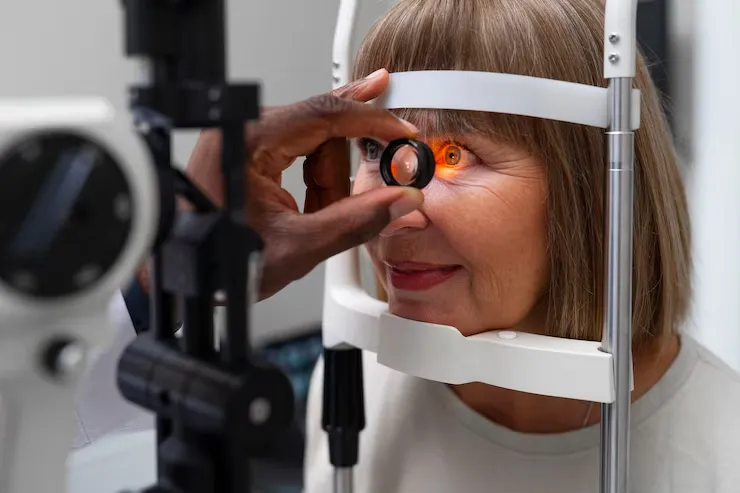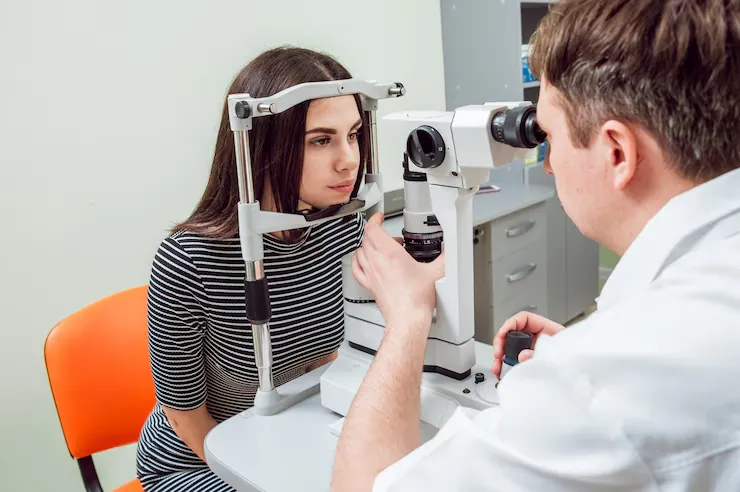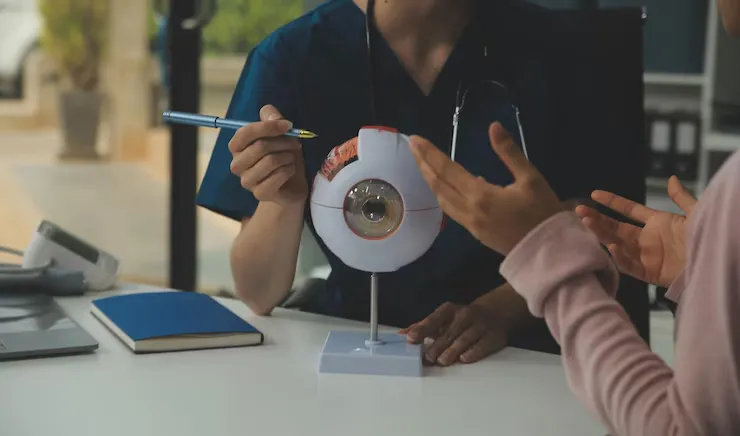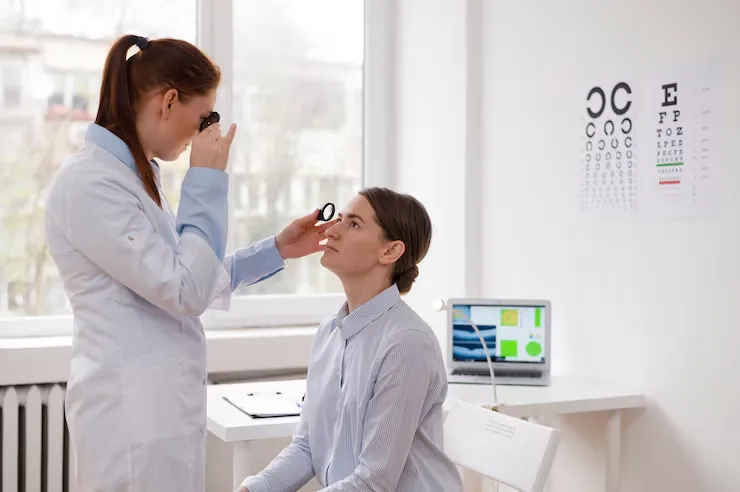Eye Health
The Connection Between Eye Health and Overall Wellness
FSDAVCFEBFEVSDDVFSD
FSDAVCFEBFEVSDDVFSD
FSDAVCFEBFEVSDDVFSD
Eyes Reflect Overall Health
Your eyes do more than just help you see—they can offer insights into your overall health. During comprehensive eye exams, optometrists can identify early signs of systemic conditions like diabetes and hypertension by examining the blood vessels in the retina. These early indicators often appear before noticeable symptoms, making regular eye exams essential for early detection.
For example, diabetic retinopathy, a complication of diabetes, can be detected through retinal exams, allowing for timely intervention to prevent vision loss. Similarly, hypertensive retinopathy, caused by high blood pressure, can be observed during an eye exam, prompting further medical evaluation. Prioritizing regular eye exams helps safeguard both vision and overall health.
Your eyes do more than just help you see—they can offer insights into your overall health. During comprehensive eye exams, optometrists can identify early signs of systemic conditions like diabetes and hypertension by examining the blood vessels in the retina. These early indicators often appear before noticeable symptoms, making regular eye exams essential for early detection.

For example, diabetic retinopathy, a complication of diabetes, can be detected through retinal exams, allowing for timely intervention to prevent vision loss. Similarly, hypertensive retinopathy, caused by high blood pressure, can be observed during an eye exam, prompting further medical evaluation. Prioritizing regular eye exams helps safeguard both vision and overall health.

Detecting Systemic Conditions
Comprehensive eye exams play a crucial role in uncovering underlying health issues that may not be immediately apparent. During these exams, optometrists can observe the retina and other ocular structures for early signs of systemic conditions like diabetes and hypertension. Diabetic retinopathy, for instance, is a complication of diabetes that causes damage to the blood vessels in the retina, while hypertensive retinopathy results from changes caused by high blood pressure. These changes in the eye can indicate potential health risks long before other symptoms appear.
The eyes offer a unique window into a person's overall health, and eye exams can also reveal early signs of autoimmune diseases, certain cancers, and other health conditions. By detecting these issues early, optometrists can help prevent more serious complications by encouraging timely medical intervention.
Integrating regular eye exams into routine healthcare allows individuals to monitor their systemic health proactively. By identifying potential health problems early, eye exams enable prompt diagnosis and treatment, contributing to better overall wellness. This approach not only helps protect your vision but also supports your overall health by addressing systemic conditions before they worsen. Regular eye check-ups are a vital component of a holistic healthcare routine.
Importance of Regular Exams

Routine eye examinations are vital not just for maintaining clear vision, but also for monitoring overall health. Through these exams, optometrists can detect early signs of systemic conditions, such as diabetes and hypertension, by examining changes in the retina’s blood vessels. These subtle indicators often appear before other symptoms, allowing for early intervention and better management of potential health issues.
In addition to detecting diabetes and hypertension, regular eye exams can uncover signs of autoimmune disorders and other health concerns, prompting further medical evaluation.

By prioritizing routine check-ups, individuals can stay proactive about their health, ensuring that underlying issues are addressed before they escalate. Regular eye exams provide an invaluable opportunity to safeguard both your vision and overall health, supporting early diagnosis and more effective treatment.
Incorporating regular eye exams into one’s healthcare routine is a proactive and essential step toward achieving comprehensive wellness. While these exams primarily focus on vision, they offer valuable insights into an individual’s overall health. By examining the retina and other ocular structures, optometrists can identify early signs of systemic conditions, such as diabetes, hypertension, and even certain cancers. Often, these symptoms appear in the eyes before any other noticeable signs, making routine eye exams an important tool for early detection.
Early detection through eye exams can significantly improve the management of health conditions and prevent serious complications. For instance, conditions like diabetic retinopathy and hypertensive retinopathy can be identified early, enabling timely interventions to prevent further damage. Additionally, eye exams can provide clues about autoimmune diseases and other systemic health issues. By prioritizing regular eye exams, individuals ensure that potential health concerns are identified early, leading to better treatment outcomes and overall wellness. Regular eye care not only protects your vision but also plays a crucial role in maintaining overall health.
Eye Health and Lifestyle
Maintaining eye health is deeply intertwined with overall lifestyle choices. A balanced diet rich in nutrients such as omega-3 fatty acids, lutein, and vitamins C and E plays a key role in supporting ocular health. Regular physical activity also boosts circulation, benefiting both the eyes and systemic health. These habits, combined with a healthy lifestyle, can significantly reduce the risk of developing eye conditions and promote long-term visual wellness.
In addition to diet and exercise, protecting eyes from excessive screen time and harmful UV rays is vital. The 20-20-20 rule—looking at something 20 feet away for 20 seconds every 20 minutes—helps reduce digital eye strain. Wearing sunglasses that block UV rays is essential for preventing cataracts and other UV-related eye issues. By integrating healthy habits, prioritizing eye protection, and scheduling regular eye exams, individuals can enhance their vision and overall well-being, ensuring sustained ocular and systemic health for the future.
Collaborative Healthcare Approach
Eye health professionals play a pivotal role in the broader healthcare system. By detecting signs of systemic diseases during eye exams, optometrists can collaborate with other healthcare providers to ensure comprehensive patient care. This interdisciplinary approach facilitates early diagnosis and coordinated treatment plans.
For example, identifying diabetic retinopathy during an eye exam can prompt referrals to endocrinologists for blood sugar management. Similarly, signs of hypertensive retinopathy may lead to consultations with primary care physicians or cardiologists. This collaborative model enhances patient outcomes by addressing health issues holistically.
Eye health professionals play a pivotal role in the broader healthcare system. By detecting signs of systemic diseases during eye exams, optometrists can collaborate with other healthcare providers to ensure comprehensive patient care. This interdisciplinary approach facilitates early diagnosis and coordinated treatment plans.
For example, identifying diabetic retinopathy during an eye exam can prompt referrals to endocrinologists for blood sugar management. Similarly, signs of hypertensive retinopathy may lead to consultations with primary care physicians or cardiologists. This collaborative model enhances patient outcomes by addressing health issues holistically.

Encouraging open communication between eye care professionals and other healthcare providers ensures that patients receive comprehensive evaluations and timely interventions. This integrated approach underscores the importance of eye exams in the context of overall health management.

Encouraging open communication between eye care professionals and other healthcare providers ensures that patients receive comprehensive evaluations and timely interventions. This integrated approach underscores the importance of eye exams in the context of overall health management.
Eye Exams and Chronic Conditions
Chronic conditions like diabetes and hypertension can have serious consequences for eye health, making regular eye exams an essential part of managing these conditions. One of the most significant risks for individuals with diabetes is diabetic retinopathy, which occurs when high blood sugar levels damage the blood vessels in the retina. This condition can lead to vision loss if not detected and managed early. Regular eye exams help detect changes in the retina before significant damage occurs, enabling timely intervention to preserve vision.
Similarly, hypertension, or high blood pressure, can cause changes in the retinal blood vessels, leading to hypertensive retinopathy. Often, these changes occur without noticeable symptoms, which is why comprehensive eye exams are so important. Eye care professionals can identify these subtle changes, allowing for early intervention to prevent further damage. Left untreated, hypertensive retinopathy can lead to more severe vision problems, making detection in its early stages crucial.
For individuals living with chronic conditions, prioritizing regular eye check-ups is vital. These exams offer valuable insights into how systemic conditions like diabetes and hypertension are affecting the eyes. Eye care professionals can also monitor the progression of these diseases, helping to adjust treatment plans as necessary to prevent complications.
By closely monitoring eye health through routine exams, individuals with chronic conditions can better manage their overall health and maintain optimal vision. Early detection and intervention are key to reducing the risk of severe eye issues, ensuring that these patients can continue to enjoy a high quality of life while managing their chronic conditions effectively.
Preventive Eye Care Tips
Preventive measures are essential for maintaining optimal eye health. Regular eye exams play a crucial role in detecting potential issues early, enabling prompt treatment. These check-ups can help spot early signs of conditions like diabetic retinopathy or hypertensive retinopathy, ensuring timely intervention.

Preventive measures are essential for maintaining optimal eye health. Regular eye exams play a crucial role in detecting potential issues early, enabling prompt treatment. These check-ups can help spot early signs of conditions like diabetic retinopathy or hypertensive retinopathy, ensuring timely intervention.
Incorporating eye-friendly nutrients into your diet, such as leafy greens and fish rich in omega-3 fatty acids, supports ocular health. Protecting your eyes from harmful UV rays by wearing sunglasses and limiting screen time can prevent strain and long-term damage. Proper lighting during reading or work also reduces eye fatigue.
Incorporating eye-friendly nutrients into your diet, such as leafy greens and fish rich in omega-3 fatty acids, supports ocular health. Protecting your eyes from harmful UV rays by wearing sunglasses and limiting screen time can prevent strain and long-term damage. Proper lighting during reading or work also reduces eye fatigue.
In addition, staying hydrated and avoiding smoking contribute to overall eye wellness. By adopting these preventive strategies, individuals can safeguard their vision and identify systemic health issues early. Regular consultations with eye care professionals ensure any changes in eye health are addressed promptly, supporting long-term well-being.
Conclusion
Eye health is an essential aspect of overall wellness. Regular comprehensive eye exams not only help maintain vision but also serve as a valuable tool for detecting early signs of systemic health issues like diabetes and hypertension. These exams allow for early intervention, ensuring that potential problems are addressed before they develop into more serious conditions. By prioritizing eye care and adopting a healthy lifestyle, individuals can protect both their vision and overall health.
A collaborative approach to healthcare, where eye care professionals work alongside other medical providers, enhances patient outcomes through coordinated care. Emphasizing preventive measures such as routine eye exams, proper nutrition, and lifestyle adjustments ensures that any changes in eye health are promptly addressed. Maintaining eye health is crucial for long-term well-being, as it supports not only clear vision but also contributes to the overall management of systemic health, ensuring a better quality of life.

Contact Info
Hours of Operation
Mon - Fri | 9:00 AM - 5:00 PM
Sat - Sun | Closed
Holiday Hours: We are closed for the following holidays: New Years Day, Memorial Day, Independence Day, Labor Day, Thanksgiving Day, Christmas Day
© 2026 Kleinwood Vision. All rights Reserved.


